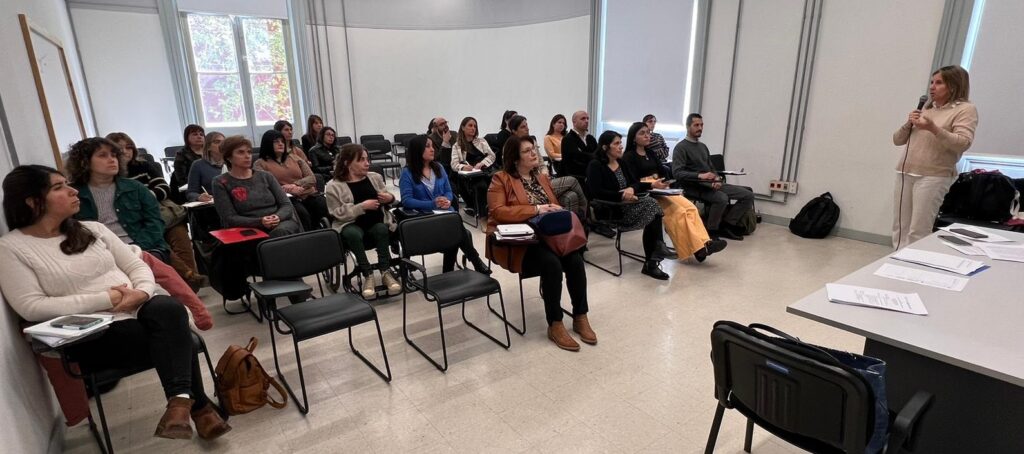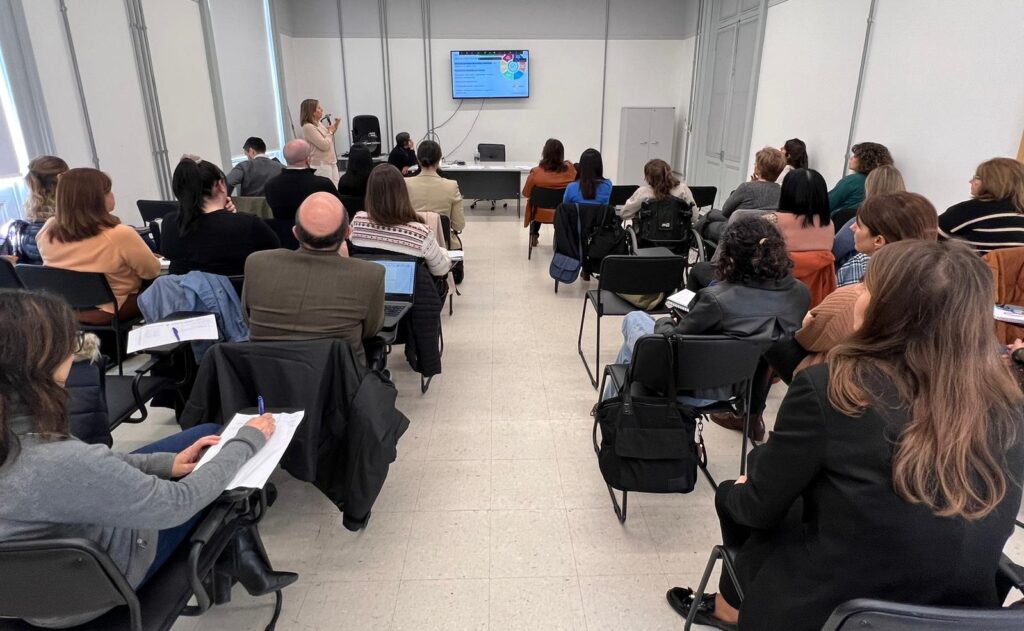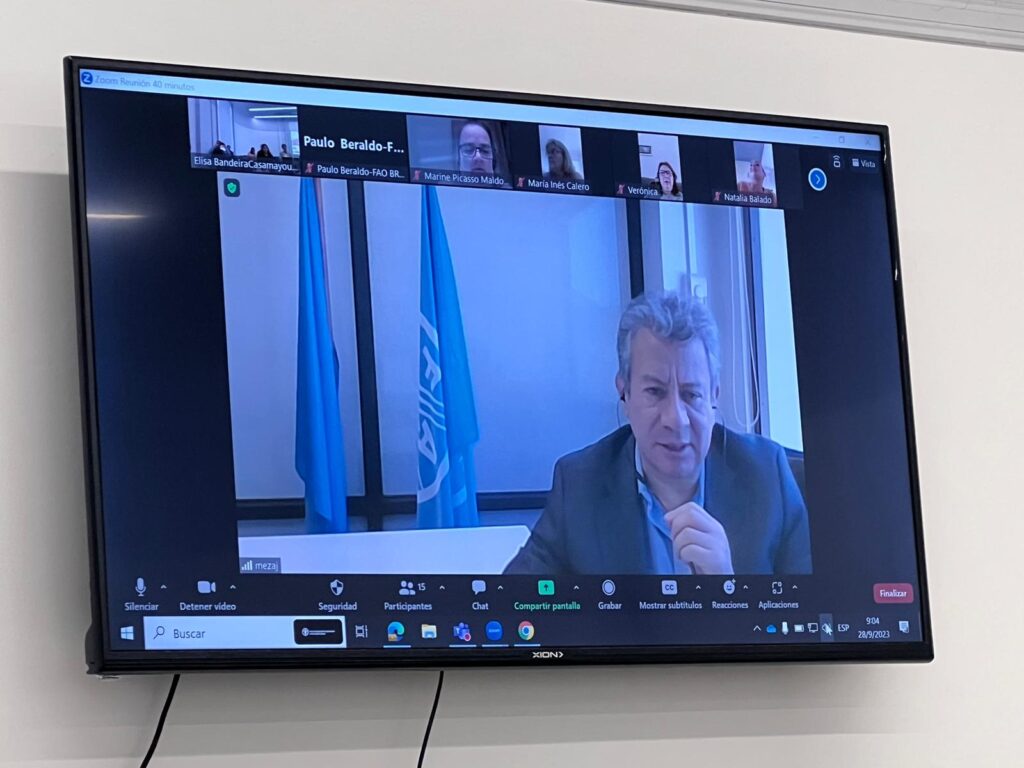The objective of the hybrid activity was to present the work of the Sustainable School Feeding Network and exchange information about the Sustainable Schools Mission, conducted in Peru in August.
Paulo Beraldo
Brasília, Brazil, October 2, 2023 – The Food and Agriculture Organization of the United Nations (FAO) in Uruguay and the country’s Directorate of Initial and Primary Education (ANEP), which coordinates the local school feeding programme (SFP), engaged in a hybrid dialogue about their participation in the Sustainable School Feeding Network (RAES) on September 28.
RAES is driven by the Government of Brazil, through the Brazilian Cooperation Agency (ABC), the National Fund for Educational Development (FNDE), and FAO. About 60 professionals from various fields of knowledge and from various Uruguayan departments participated in the activity. The goal was to share the main learnings from the Technical Mission on the Sustainable Schools methodology carried out in August in Peru by RAES, which involved representatives from Uruguay and 12 other countries.

The event also provided an opportunity to present the work of the RAES Network, with an emphasis on exchanging experiences and knowledge, fostering dialogue on school feeding, and supporting countries in strengthening their school feeding programmes, based on the principle of the human right to food.
The activity was opened by Jorge Meza, FAO Representative in Argentina and Uruguay. He stated that in a global context where food and agriculture face complex challenges involving livelihoods, people’s well-being, and environmental conservation, there is a recognized need to address these challenges in an integrated manner.
“School feeding has stood out as a multisectoral policy that allows countries to advance towards various goals in strategic areas such as education, health, agriculture, social development, environment, territorial development, among others,” he emphasized. “FAO actively works on promoting actions aimed at improving dietary habits in the student population and their families through food and nutritional education, as well as encouraging the sustainable development of the local economy through direct purchases from family farmers.”
The General Directorate of Initial and Primary Education was represented by Lilian Pereyra, who emphasized the importance of uniting the various actors in the Uruguayan PAE in dialogues and exchanges like this, reinforcing the significance and weight of the school feeding policy in the country. In the presentation of RAES, the history of the Network that began in 2018, the promotion of dialogue and knowledge generation in school feeding, and the fact that 21 countries are already dialoguing in an articulated manner on the subject were highlighted.
It was also mentioned that RAES has a virtual platform – www.redraes.org – and the launch of a series of podcasts to strengthen training in Sustainable Schools was highlighted, in addition to supporting teacher training actions in 10 countries in 2023.

Sustainable Schools Mission
The two professionals from Uruguay who shared their experience of the Sustainable Schools mission were Rosa Lezue, a teacher and director of the school feeding programme, and Caren Zelmonovich, the nutritional advisor of SFP. Some of the topics included actions of food and nutritional education observed in Peruvian schools.
They also mentioned the approach of schools to local producers so they can provide for school feeding and highlighted the strong coordination observed among different institutions in areas such as agriculture, health, assistance, social development, education, as well as local municipalities.
“While our programme has many strengths and is very structured, there are some issues we are not addressing, such as intersectoral coordination,” said Rosa Lezue. “This mission opened up a world for us. I believe we must always be humble and think about how we can improve, so it’s important to always exchange knowledge,” commented Zelmonovich.

Exchange
After the talks, there was a group workshop to exchange experiences and reflections on possibilities for strengthening the Uruguayan PAE. The highlighted topics were:
- Socializing good practices and actions already carried out in the country that can be scaled up;
- Training teachers and school staff to implement practices in food and nutrition education;
- Involving families in more dialogues about food;
- Working on school gardens in various subjects;
- Strengthening intersectoral coordination;
- Organizing visits to schools that carry out successful actions;
- Bringing students closer to local producers;
- Training cooks to improve recipes;
- Better informing about the seasonality of products;
- Connecting isolated actions and effectively marketing them;
- Presenting recipe books to producers who may not be aware of this material;
- Securing more support from municipalities for producers;
- Learning about experiences from other institutions;
- Contacting RAES to learn more about international experiences.
“This event was an opportunity to disseminate, exchange, and reflect with professionals responsible for school feeding, representatives of health, social development, and academia about the important work carried out by the School Feeding Programme,” said Elisa Bandeira, expert in liaison and strategic partnerships at FAO Uruguay. “It was also very important to disseminate the work of RAES at the national level.”







